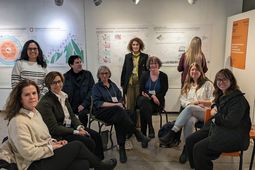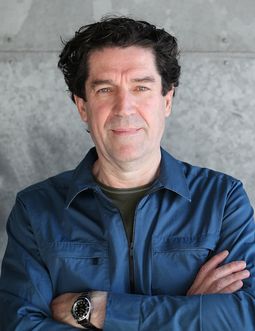How can we create more inclusive and democratic spaces and public places, taking into account how users, citizens and members of marginalized communities experience architectural quality in real life?
And how can the training of future generations of professionals, social actors and municipal stakeholders improve their understanding and strengthen their capacity to work for architecture and urban landscapes that allow differences to thrive?
Interdisciplinary and cross-sectoral teams of more than 70 researchers from 14 Canadian universities and more than 65 citizen, municipal, public and professional organizations have come together in a partnership called Quality in Canada's Built Environment: Roadmaps to Equity, Social Value and Sustainability to grapple with these questions.
At the midpoint of this large-scale project, nearly 180 people gathered in Halifax from May 1 to 3 to attend workshops that unveiled the first versions of 14 roadmaps to quality. These roadmaps chart a path towards improving the quality of Canada's built environment through architecture of social value.
The partnership has been led since 2022 by Professor Jean-Pierre Chupin of the Architecture School in Université de Montréal's Faculty of Environmental Design. He also holds the Canada Research Chair in Architecture, Competitions and the Mediation of Excellence.
Architecture in question
The idea of bringing together a large pool of partners from the research community and civil society emerged shortly before the pandemic and was realized over the next two years.
"As it sought to address issues of diversity, equity and inclusion, the architectural research community in all the schools across the country realized that a series of interconnected quality crises is hitting Canada's built environment: there's the climate crisis, the housing crisis, urban crises related to inclusion, homelessness and accessibility, not to mention heritage and territorial crises," said Chupin.
A total of $8.5 million in funding was raised to support an urgent reappraisal of architecture, including $2.5 million from the Social Sciences and Humanities Research Council and nearly $6 million from academic, community, municipal, institutional and professional partners.
Since the beginning of the partnership, its members have alternated between local and national efforts to address 14 issues deemed critical for Canada. They have met at annual conventions-the first in Montreal in 2022 and the second in Calgary last year-to report on their progress and propose potential national strategies to improve quality.
Inclusive projects focused on essential needs
The 14 research teams are guided by two key principles. First, they must systematically include three groups in addition to academics: citizens, actors in public procurement and representatives of professionals. Secondly, "their roadmaps must address essential needs in the vicinity of their home universities and be based on an understanding of lived experience," Chupin explained. "Each project must be situated in a social context and operate on a bottom-up model."
In Montreal, for example, the UdeM-coordinated team is working on spaces for people with special needs, the team led by Concordia is focusing on urban biodiversity, and the McGill team is looking at urban nightscape design for marginalized communities.
Meanwhile, the University of Toronto and UBC are tackling equitable resilience in open spaces and urban parks, and the University of Calgary and Toronto Metropolitan University (formerly Ryerson) are exploring inclusive urban approaches, including access to public spaces on the Lake Ontario waterfront.
The team led by the University of Waterloo is dealing with the social housing crisis, the Dalhousie-led team with educational spaces, the Université Laval team with quality management processes at the urban scale, and Carleton University is focusing on adaptive and heritage reuse. Finally, teams in Northern Ontario, Manitoba and Alberta are working specifically on the criticals issues of housing and access to decent, quality living spaces in Indigenous communities.
Dealing with complexity
Chupin describes these projects as "serial research." They are being carried out by academics and partners who "subscribe to the key assumption that only a partnership-based design process can confront such complexity in the near future without falling back into fragmented silos of expertise," he said. "Only cross-sector collaboration, nourished by the sharing of lived experience, will be able to accommodate and meet the needs and expectations of all."
The Canada Foundation for Innovation has funded the creation of a digital platform for the partnership. The Living Atlas of Quality in Architecture and the Built Environment maps experiences and proposals in order to support pedagogical change and develop solutions rooted in local geographies and cultures. Chupin calls it "the finest project I've been involved with in my career as a researcher and teacher".
UdeM pilots and participates in the partnership
In addition to Jean-Pierre Chupin, who is coordinating the Canada-wide partnership, several UdeM faculty members play important roles, including Carmela Cucuzzella, dean of the Faculty of Environmental Design, who has co-chaired the governance and steering committees since the project's inception in 2019; architect and professor Anne Cormier; Architecture School director Izabel Amaral; and library science researcher Vincent Larivière.
The project based at UdeM, the Material Innovation in Spaces for Special Needs roadmap, is coordinated by professors Virginie LaSalle of the Design School and Bechara Helal of the Architecture School. The civil society representatives are from the Fondation Véro et Louis pour l'autisme, the Société Logique experte en accessibilité universelle and the Montreal Mental Health University Institute. The professionals are from the architecture firms Provencher_Roy, EVOQ Architecture, Affleck de la Riva and Chevalier Morales, as well as the Ordre des architectes du Québec and the Association des architectes en pratique privée du Québec. The City of Montreal is represented by officials from the building planning and management department and the design bureau.








